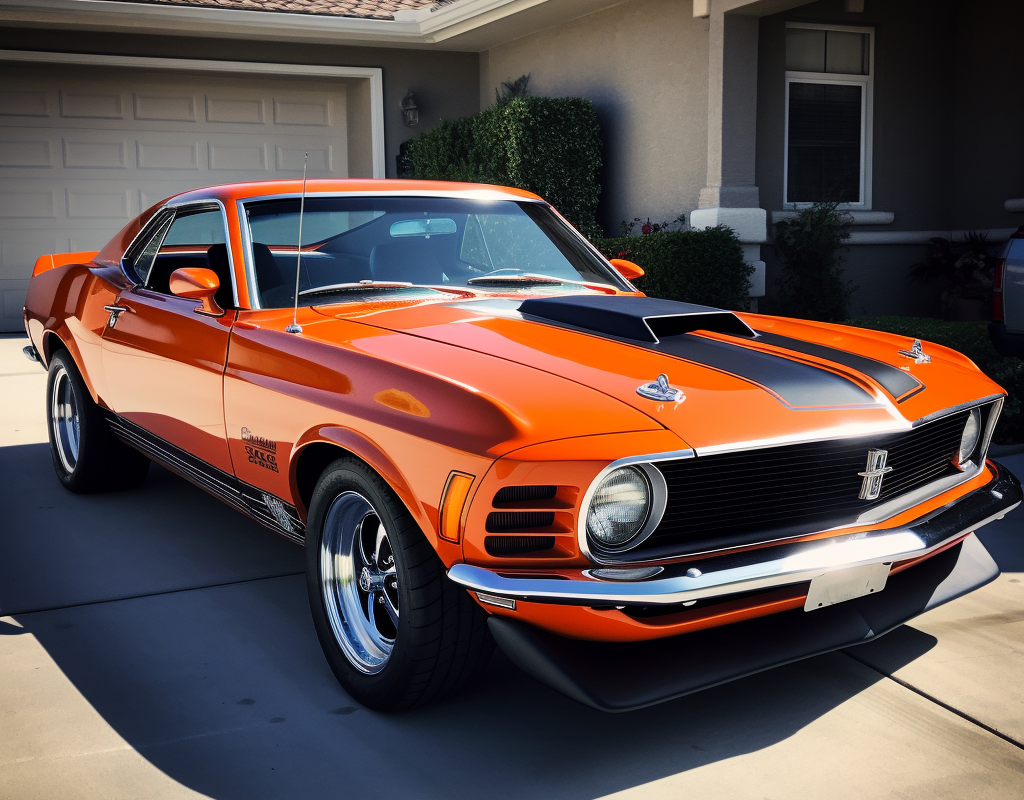Discover the hottest muscle cars for sale! Cruise in style and embrace the thrill of owning a classic beauty
Introduction to Muscle Cars
If you have a passion for classic, vintage cars, then you’re likely familiar with the allure of muscle cars. These powerful machines have captivated generations of car enthusiasts with their iconic status and thrilling performance. In this section, we will explore what defines muscle cars and the reasons behind their enduring appeal.
What Are Muscle Cars?
Muscle cars are high-performance vehicles with powerful engines, typically V8 engines, designed for straight-line speed and acceleration (Muscle Cars Illustrated). These American icons are known for their aggressive styling, muscular stance, and the distinctive rumble of their engines. They represent a unique era in automotive history, where automakers competed to produce the most powerful and stylish vehicles.

The Appeal of Muscle Cars
The appeal of muscle cars lies in their combination of power, speed, and nostalgia. These vehicles evoke a sense of freedom, individuality, and the golden era of American automotive design (Muscle Cars Illustrated). They are more than just cars; they are cultural symbols that represent a specific time in American history.
One of the key factors that make muscle cars so appealing is their raw power and performance capabilities. The high horsepower and torque of these vehicles deliver exhilarating driving experiences, allowing you to feel the adrenaline rush of acceleration and experience the thrilling rumble of a powerful engine (Muscle Cars Illustrated). The design of muscle cars further enhances their appeal. With their bold and aggressive exteriors, wide tires, and muscular stance, they exude a sense of strength and dominance on the road.
Muscle cars also hold a nostalgic connection to the past. They remind enthusiasts of a time when cars were simpler, more powerful, and embodied the spirit of freedom and rebellion. These vehicles evoke memories of cruising down open roads, drag racing, and the excitement of the open highway. The timeless appeal of muscle cars lies in their ability to evoke emotions and create a sense of nostalgia.
Moreover, muscle cars have a dedicated community of collectors, restorers, and enthusiasts who appreciate their unique blend of performance, style, and heritage. They continue to captivate new generations of car enthusiasts and remain an integral part of American automotive culture (Muscle Cars Illustrated). Whether you’re drawn to the iconic designs, the power under the hood, or the cultural significance, muscle cars continue to inspire passion and admiration.
So, if you’re looking for a classic, vintage car with power, style, and a rich history, exploring the world of muscle cars is sure to be an exciting journey. Whether you’re a seasoned collector or a budding enthusiast, the allure of these iconic vehicles is bound to leave a lasting impression.
Shopping for a Muscle Car
If you’re in the market for a classic, vintage muscle car, there are several avenues you can explore to find the perfect ride. From online platforms to specialized dealerships, there are various options available to help you find the muscle car of your dreams. Let’s take a closer look at where you can find muscle cars for sale, popular models and their price range, as well as factors to consider when buying.
Where to Find Muscle Cars for Sale
When it comes to finding muscle cars for sale, there are several reliable sources you can turn to. Here are a few popular platforms to get you started:
- Hemmings.com: Hemmings is a trusted website for buying and selling classic cars, including muscle cars. They currently have an extensive collection of over 1,000 muscle cars for sale, ranging from Chevrolet Camaros to Ford Mustangs and Dodge Challengers (Hemmings). Their listings provide detailed descriptions and multiple photos to help you make an informed decision.
- eBay Motors: eBay Motors offers a wide selection of muscle cars for sale, with both auction-style listings and fixed-price options available. It’s a platform that allows you to browse through a vast inventory and potentially find the muscle car you’ve been searching for.
- ClassicCars.com: ClassicCars.com is another reputable online platform that specializes in classic and vintage vehicles. With over 30,000 listings, they have a dedicated section for muscle cars, making it easier to find the specific model you desire.
- AutoTrader Classics: AutoTrader Classics is a trusted platform for finding muscle cars for sale. With a dedicated section specifically for classic and vintage vehicles, you can easily navigate through their listings and explore the muscle cars available.
These platforms provide a wide range of options and allow you to filter your search based on criteria such as make, model, price range, and location. Remember to thoroughly research each listing, review the vehicle history, and consider reaching out to sellers for additional information.
Popular Models and Price Range
Muscle cars come in various makes and models, each with its own unique characteristics and performance capabilities. Some popular models you may come across when browsing for muscle cars include the Chevrolet Camaro, Ford Mustang, Dodge Challenger, Pontiac GTO, and Plymouth Barracuda, among others. These iconic models have left their mark on automotive history and continue to captivate enthusiasts with their power and style.
When it comes to the price range of muscle cars for sale, it varies depending on factors such as the make, model, condition, rarity, and demand. According to Hemmings, prices can range from $10,000 for a project car in need of restoration to well over $1 million for rare and highly sought-after models. It’s essential to set a budget and consider factors such as ongoing maintenance costs and potential restoration expenses when determining the price range that works for you.
Factors to Consider When Buying
Buying a muscle car is an exciting endeavor, but it’s crucial to consider certain factors before making a final decision. Here are some key considerations:
- Condition: Assess the overall condition of the muscle car. Determine whether it requires any restoration or if it’s in excellent shape with low mileage. Consider the potential costs and time investment associated with restoring a classic muscle car.
- Documentation: Look for proper documentation, including titles, service records, and any historical information available. This will provide insights into the car’s authenticity and ownership history.
- Mechanical Inspection: If possible, have a trusted mechanic or automotive expert inspect the muscle car to identify any underlying mechanical issues or potential concerns.
- Budget: Set a realistic budget that not only covers the purchase price but also accounts for ongoing maintenance, insurance, and potential modifications or upgrades.
- Ownership History: Research the ownership history of the muscle car, especially if it has changed hands multiple times. A well-documented ownership history can add value and provide reassurance about the car’s care and maintenance.
By considering these factors and conducting thorough research, you can make an informed decision when purchasing a classic, vintage muscle car. Remember to take your time, explore multiple options, and ensure that the muscle car you choose aligns with your preferences, budget, and long-term goals.
Maintaining a Muscle Car
Owning a classic muscle car is a thrilling experience, but it also comes with responsibilities. Proper maintenance is essential to keep your vintage beauty running smoothly and ensure its longevity. In this section, we will explore three key aspects of maintaining a muscle car: fuel efficiency and performance, specialty oils and maintenance, and attention and interaction with others.
Fuel Efficiency and Performance
Muscle cars have a reputation for drinking gasoline, with some models only getting around 12mpg on the highway. However, it’s important to remember that these cars were built for performance, not fuel efficiency. Many muscle car owners adopt the mantra “smiles per gallon, not miles per gallon” (Car Throttle). To optimize fuel efficiency, consider the following tips:
- Ensure your muscle car is properly tuned and maintained to maximize its performance potential.
- Drive with a smooth and steady throttle to minimize unnecessary fuel consumption.
- Avoid excessive idling and aggressive acceleration, as these can significantly impact fuel economy.
- Regularly check and maintain tire pressure to ensure optimal fuel efficiency.
Specialty Oils and Maintenance
Older muscle cars require specialty oils that are low on detergents and high on zinc due to the use of flat tappet camshafts. Modern oils may not provide adequate protection for these components, which can result in damage over time. As a result, you may need to pay a bit more for an oil change, but it’s a worthwhile investment to ensure the longevity of your engine.
In addition to specialty oils, regular maintenance is crucial for keeping your muscle car in top shape. This includes regular oil changes, fluid checks, and inspections of vital components such as belts, hoses, and brakes. Adhering to a strict maintenance schedule will help prevent major issues and keep your muscle car running smoothly.
Attention and Interaction with Others
Owning a muscle car often attracts attention wherever you go. People of all ages admire these vintage vehicles and may approach you to ask questions or share their own stories. Embrace the opportunity to connect with fellow car enthusiasts and share your passion for classic muscle cars.
However, it’s important to be aware that owning a muscle car can also draw the attention of law enforcement. While many police officers have a soft spot for muscle cars, the combination of a powerful engine and eye-catching appearance can sometimes lead to being pulled over. To minimize any potential issues, ensure that your muscle car is compliant with local regulations and traffic laws. Always drive responsibly and respect speed limits.
Another aspect of owning a muscle car is the interaction with others on the road. Muscle car owners often receive requests from enthusiasts to “light ’em up” and perform a burnout. While this can be exciting, it’s essential to prioritize safety and legality. Engaging in such activities should only be done in appropriate settings, such as racetracks or sanctioned events.
By considering fuel efficiency and performance, using specialty oils and following a strict maintenance schedule, and being aware of the attention and interaction with others, you can ensure that your muscle car remains in excellent condition and continues to bring joy to both you and those around you. Remember, owning a muscle car is a unique experience that goes beyond simply owning a vehicle—it’s a way to embrace a rich automotive history and be part of a passionate community of muscle car enthusiasts.
The Thrills and Challenges of Owning a Muscle Car
Owning a classic muscle car is an exhilarating experience that comes with its own set of thrills and challenges. Let’s explore some of the unique aspects of being a muscle car owner.
The Attention and Admiration
One of the most exciting aspects of owning a muscle car is the attention and admiration it garners wherever you go. People of all ages, both young and old, can’t help but admire the timeless beauty and power of these iconic vehicles. Whether you’re cruising down the street or parked at a car show, you can expect heads to turn and conversations to spark.
The Police and Muscle Cars
It’s no secret that muscle cars often catch the attention of law enforcement. The combination of powerful engines and the desire to unleash their performance can sometimes lead to encounters with the police. However, it’s important to note that many officers have a soft spot for muscle cars and appreciate the passion and admiration owners have for these vehicles. Adhering to traffic laws and being mindful of speed limits can help ensure a positive experience on the road.
The Culture and Community of Muscle Car Owners
Owning a muscle car opens the door to a vibrant culture and a close-knit community of fellow enthusiasts. Attending car shows, swap meets, and local gatherings provides an opportunity to connect with collectors and enthusiasts who share the same passion for classic muscle cars. These events offer a chance to showcase your vehicle, exchange knowledge and tips, and even discover potential opportunities to buy or sell muscle cars (West Coast Shipping Blog).
Tuning and Personalizing Your Muscle Car
Tuning and personalizing your muscle car is an essential part of the ownership experience. Unlike modern cars with computer-controlled systems, tuning a classic muscle car requires a more hands-on approach. It involves learning to tune the vehicle the old-fashioned way, using basic hand tools and applying classic techniques. This process not only enhances the performance and character of your muscle car but also allows you to develop a deeper connection with your vehicle.
It’s worth noting that owning a muscle car also comes with the challenge of finding and sourcing parts for restoration and maintenance. However, the community of muscle car owners and specialized vendors can offer valuable resources and support to help you keep your classic beauty in top shape.
Being a muscle car owner is a thrilling journey filled with passion, camaraderie, and a shared love for these timeless vehicles. Embrace the attention and admiration, engage with the community, and enjoy the unique experience of owning and driving a classic muscle car.
Tuning and Personalizing Your Muscle Car
Whether you’re a proud owner of a classic muscle car or considering purchasing one, tuning and personalizing your vehicle allows you to make it truly your own. From learning the old-fashioned ways of tuning to exploring upgrades and modifications, there are various ways to enhance the performance and style of your muscle car.
Learning to Tune the Old-Fashioned Way
Owning a muscle car often means embracing the nostalgic charm of these classic vehicles. To truly connect with your car, many enthusiasts choose to learn to tune their vehicles the old-fashioned way, with more hands-on work and basic hand tools. Tuning old muscle cars takes patience, finesse, and a willingness to get your hands dirty. It allows you to understand the intricacies of your vehicle’s engine and make adjustments to optimize performance and efficiency (Car Throttle).
Upgrades and Modifications
Upgrades and modifications are common among muscle car owners, as they provide opportunities to enhance performance and personalize the vehicle to suit individual preferences. From engine modifications and exhaust upgrades to suspension enhancements and brake improvements, there are countless aftermarket parts available to improve the power, handling, and overall driving experience of your muscle car. These upgrades can be tailored to meet your specific goals, whether you’re looking for increased horsepower, better cornering capabilities, or improved braking performance (Car Throttle).
Customization and Personal Style
One of the joys of owning a muscle car is the ability to customize it to reflect your personal style. From paint jobs and decals to interior modifications and custom upholstery, the possibilities for personalization are endless. Many muscle car enthusiasts take pride in transforming their vehicles into unique expressions of their personality and taste. Classic car dealerships and online marketplaces offer a wide range of aftermarket parts and accessories, making it easier than ever to find the perfect components to make your muscle car stand out from the crowd.
The muscle car community is known for its passion and creativity, with owners often sharing their customization projects and seeking inspiration from others. Participating in car shows and events can provide opportunities to connect with fellow enthusiasts and gain ideas for your own personalization projects. Whether you prefer a sleek and polished look or a bold and aggressive design, the ability to customize your muscle car allows you to make it a true reflection of your style and personality.
As you embark on the journey of tuning and personalizing your muscle car, remember to prioritize the restoration and maintenance of its original features. Preserving the authenticity and character of these classic vehicles is an essential part of being a responsible muscle car owner. With the right mix of tuning, upgrades, and personal style, your muscle car will not only be a thrilling ride but also a unique expression of your automotive passion.







